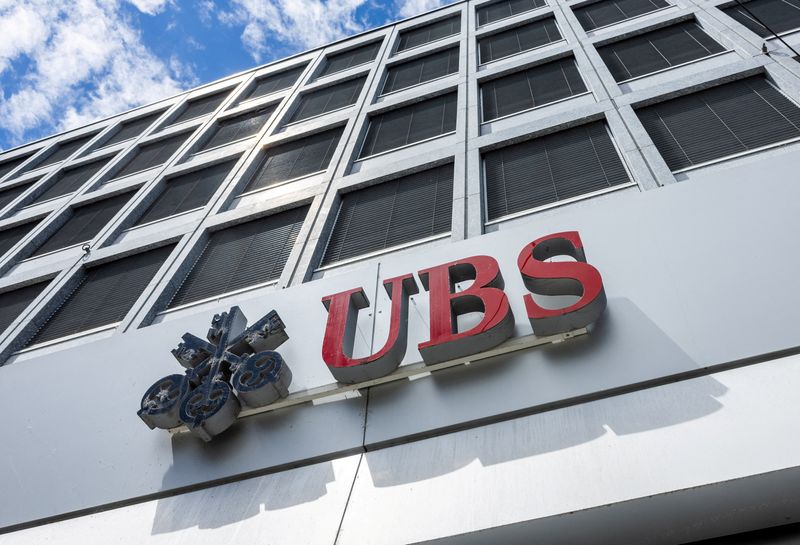By Dave Graham
ZURICH (Reuters) – UBS Group on Wednesday posted third-quarter profit well above forecasts, driven by higher revenue and cost reductions, and completed a first wave of client migrations from Credit Suisse since acquiring its former rival last year.
Net profit attributable to shareholders at Switzerland’s largest bank was $1.4 billion, nearly double the $740 million estimated by analysts in a company-provided poll. Total revenue came in at $12.3 billion, beating the $11.5 billion consensus.
But the bank’s shares were more than 3.5% lower by 1330 GMT, giving up early gains of nearly 4%, after taking a hit due to uncertainty about regulatory changes, the broader outlook and how much spare capital the bank would have going into next year.
UBS CEO Sergio Ermotti hailed the bank’s revenue growth and highlighted what he called strong client momentum, particularly in the Americas and in the Asia Pacific region.
“But there is no room for complacency. We are just about halfway to restoring pre-acquisition levels of profits and returns on capital,” he told an analyst call.
Markets are waiting to see how tough Swiss authorities will be with new regulations for the bank, particularly on capital.
The government wants UBS and other systemically important banks to hold more capital to prevent the risk of another Credit Suisse-style collapse.
Ermotti said in August he expected the regulatory outlook to become clearer around the turn of the year. But on Wednesday he said it was very unlikely he would have much more clarity by February.
Andreas Venditti, an analyst at Vontobel, said Ermotti’s comments had probably helped push UBS shares into the red.
“The market does not like that the regulatory uncertainty might last longer than some might have hoped,” he said.
COST REDUCTIONS
UBS’s investment bank delivered an operating profit twice as high as the consensus forecast provided by the bank, while losses at the non-core and legacy unit, which handles unwanted Credit Suisse assets, were below expectations.
UBS said it was progressing well with cost reduction plans and now expects to achieve a figure of around $7.5 billion this year. Previously it had forecast around $7 billion.
UBS has begun moving clients from Credit Suisse onto its own platforms, and the bank completed the first phase of client account migrations in Luxembourg and Hong Kong during October.
Singapore and Japan were expected by year-end and Switzerland will follow next year, the bank said. Ermotti said he expects the process to last about 18 months.
On the fourth quarter, UBS said “ongoing geopolitical conflicts and the upcoming U.S. elections are creating uncertainties that are likely to affect investor behaviour.”
In May, UBS formally completed the merger with Credit Suisse. Ermotti said last month that UBS’s integration of its former competitor was running ahead of schedule.
Due to that progress, UBS said it accelerated amortization of so-called transitional purchase price allocation adjustments for common equity tier 1 capital. As a result, UBS’s common equity tier 1 capital ratio – a measure of financial strength – now stood at 14.3%, down from 14.9% in the previous quarter.

Citi analyst Andrew Coombs said that change and new Basel capital rules coming into force in January meant that UBS now had “very little excess capital today relative to its ~14% target, so any (share) buyback next year will now have to come out of organic capital generation, which limits the scope.”
On top of that, Coombs said, was the ongoing uncertainty surrounding the rules on capital requirements.

